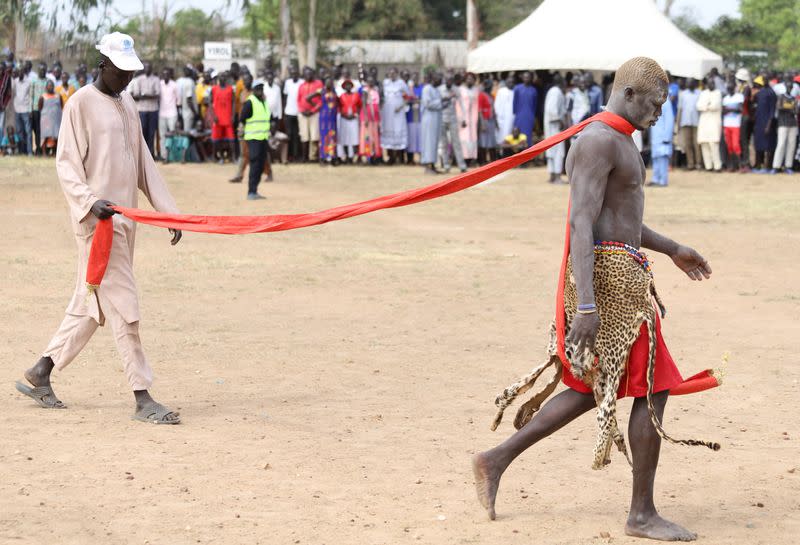GENEVA/BEIJING
Hopes the
coronavirus would be contained to China vanished on Friday as infections spread
rapidly around the world, countries started stockpiling medical equipment and
investors took flight in expectation of a global recession.
Share prices were on track for the worst week since
the global financial crisis in 2008 as virus-related disruptions to
international travel and supply chains fueled fears of recession in the United
States and the Euro zone.
The U.S. stock market fell into correction
territory with the benchmark S&P 500 index down more than 4% on Thursday,
extending a market rout that has now sliced more than 10% off of its closing
peak on Feb. 19. Asian stocks on Friday tracked Wall Street’s plunge.
“The coronavirus now looks like a pandemic. Markets
can cope even if there is big risk as long as we can see the end of the
tunnel,” said Norihiro Fujito, chief investment strategist at Mitsubishi UFJ
Morgan Stanley Securities.
“But at the moment, no one can tell how long this
will last and how severe it will get.”
Mainland China - where the virus originated late
last year - reported 327 new cases on Friday, the lowest since Jan. 23.
But with new infections reported around the world
now surpassing those in China, World Health Organization (WHO) Director General
Tedros Adhanom Ghebreyesus said nations should prepare.
“This virus has pandemic potential,” Tedros said.
“This is not a time for fear. This is a time for taking action to prevent
infection and save lives now.”
A Reuters tally showed about 10 countries reported
their first virus cases in past 24 hours, including Nigeria, the most populous
country in Africa and the first case in sub-Saharan Africa.
U.S. investment bank BofA cut its world growth
forecast to the lowest level since the peak of the financial crisis, and
ratings agency Moody’s said a coronavirus pandemic would trigger global and
U.S. recessions in the first half of the year.
In addition to stockpiling medical supplies,
governments ordered schools shut and canceled big gatherings, including sports
events, to try to halt the spread of the flu-like disease known as COVID-19.
U.S. President Donald Trump’s administration was
considering invoking special powers to rapidly expand U.S. production of
protective gear, two officials told Reuters.
In Europe, France’s number of reported cases
doubled, Germany warned of an impending epidemic and Greece, a gateway for
refugees from the Middle East, announced tighter border controls.
“We have a crisis before us. An epidemic is on its
way,” French President Emmanuel Macron said.
The death toll in Italy, Europe’s worst-hit
country, rose to 17 on Thursday and the number of people who tested positive
for the illness increased by more than 200 to 650. Germany has about 27 cases,
France around 18 and Spain 15.
Tedros told reporters in Geneva that Iran, Italy
and South Korea were at a “decisive point” in their efforts to prevent a wider
outbreak.
South Korea, which has the most cases outside
China, reported 256 new infections on Friday, bringing the total number of
infected in the country to 2,022.
Korean Air Lines Co Ltd said will check
temperatures of passengers traveling to the United States and would not allow
anyone with a temperature higher than 37.5 Celsius (99.5 Fahrenheit) to fly.
One of its flight attendant who worked on Seoul-Los Angeles flights has tested
positive.
The country’s top airline said it also planned to
expand these procedures to other routes.
There is particular concern over a case in Japan in
which a woman tested positive for the virus for a second time. Second positive
tests have also been reported in China and could imply contracting the disease
does not confer immunity.
Scientists warned that much remains unknown about
the virus, including how long it can survive on surfaces.
Hong Kong quarantined a pet dog of a coronavirus
patient after it showed “weak positive” results for the virus, even though it
did not have any symptoms. Further tests would be conducted to confirm if the
dog had been infected.
U.S. Centers for Disease Control and Prevention
(CDC)director Robert Redfield said the agency was evaluating how long
coronavirus could be infectious on surfaces.
“On copper and steel its pretty typical, it’s
pretty much about 2 hours,” Redfield told a House of Representatives hearing.
“But I will say on other surfaces - cardboard or plastic - it’s longer, and so
we are looking at this.”
He said infections contracted from surfaces rather
than through the air could have contributed to the outbreak on the Diamond
Princess cruise ship in Japan, where about 700 passengers and crew caught the
disease.
Japan is scheduled to host the 2020 Olympics in
July but the head of the WHO’s emergency program, Dr. Mike Ryan, said discussions
were being held with organizers about whether it should go ahead.
The coronavirus has played havoc with global
aviation and tourism as airlines cancel flights, countries ban visitors from
hot spots and nervous passengers put off travel.
California-based Facebook Inc said it would cancel its
annual developer conference and Microsoft Corp followed suit by withdrawing from a gaming conference scheduled for next month.
The WHO’s Ryan said Iran’s outbreak may be worse
than realized. It has suffered the highest death toll outside China, with 26
dead from 245 reported cases.
U.S. intelligence agencies are monitoring the
spread of coronavirus, including in Iran and India, sources familiar with the
matter said.
The virus has so far mainly battered China, causing
nearly 80,000 infections and almost 2,800 deaths, according official Chinese
figures. It has spread to another 46 countries, where about 3,700 cases and 57
deaths have been reported, according to the WHO.
There is no cure for the coronavirus, which can
lead to pneumonia, and a vaccine may take up to 18 months to develop. - Reuters










